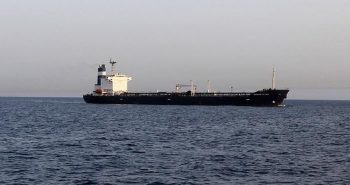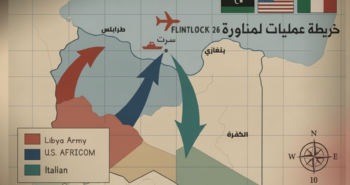Ava Gilder

Since the toppling of dictator Moammar Gadhafi’s regime in 2011, Libya been stuck in a cyclical trap of governmental mismanagement and violence. The country remains divided: The internationally recognized Libyan Government of National Unity (GNU) led by Prime Minister Abdul Hamid Dbeibeh has based its power in Tripoli, and Gen. Khalifa Haftar of the Libyan Arab Armed Forces (LAAF) controls the country’s east and south.
Local armed groups have taken control, threatening stability. In Tripoli, in addition to the GNU, the Deterrence Apparatus for Combating Organized Crime and Terrorism (DACOT/Special Deterrence Force/Rada), the Stability Support Authority (SSA), and the 444 Brigade dominate the city. Additionally, Ansar Al-Sharia, the Islamic State (ISIS), and al-Qaeda in the Islamic Maghreb have played a significant role in fragmenting Libyan security. Ansar al-Sharia is centralized in the east. ISIS is stronger in Libya’s center, where it has become a desert insurgency.
While the GNU and LAAF occasionally conduct counterterrorism operations, their lack of legitimacy and commitment to counterterrorism operations limit their effectiveness. Specifically, some Libyans believe that Rada has recently held a critical role in combating ISIS and al-Qaeda, keeping certain leaders imprisoned. However, the GNU-aligned Rada and the 444th Brigade contribute to the state’s fragility, entrenching themselves in Libya’s militia-driven governmental organization. This added layer should force policymakers to look at replacements for security against al-Qaeda and ISIS.
Russia’s growing presence in Libya poses a security and economic threat to North Africa and the international community. After the fall of the Assad regime in Syria, Russia has refocused on Libya, stationing troops and hardware in the east, where Haftar benefits from them. This arrangement gives Moscow a military command near NATO’s southern flank and influence over global energy markets. In addition, Türkiye has positioned itself militarily and economically in western Libya to expand its control in the Mediterranean and to reshape the regional balance of power.
If the U.S. does not act strategically, there will be widespread effects beyond Libya’s borders. Russia and Türkiye will play a part in dictating outcomes in Libya and eroding U.S. leverage. If Türkiye pushes back against other NATO allies, it will threaten NATO cohesion and destabilize global energy security. European states such as France and Italy also provide a layer of complexity as they compete in tackling migration, terrorism, and energy issues.
Additionally, the U.S. has been involved in Libya’s oil sector for decades, and U.S. companies such as ConocoPhillips still have interests and influence in Libyan oil concessions. The U.S. has an opportunity to invest in the state’s untapped access to oil and gas reserves.
The international community and the U.S. should advocate for the creation of a transitional political framework for a unified Libyan state governed by an inclusive, democratically elected leadership that represents all groups and factions while reducing interference from Russia and Türkiye. Focusing on countering Turkish and Russian influence will give the U.S. an opportunity to collaborate with allied EU member states to deny Türkiye and Russia a stronghold in Libya that is expanding quickly.
Instead of focusing on the national level, the crux of U.S. policy should focus on local politics and building institutions in combination with combatting Russian and Turkish influence using public benchmarks that incentivize the two Libyan governments to decrease reliance on foreign meddling. Local governments, once established, with the help of NATO Intelligence, Surveillance, and Reconnaissance Force, should call for unified elections to bring together the state and its people. If the international community can peacefully support the separate Libyan governments in fostering common ground, mitigating the fragile security situation of the state, and increasing stability in the region, lasting peace becomes a real possibility.
Roots of Libyan Instability
Post-revolution Libya has struggled with civil conflict because of its porous borders, corruption, and militaristic government structure.
The overthrow of Gadhafi and the 2014-2020 civil war that followed exacerbated Libya’s domestic challenges. Libya continues to struggle with rebuilding critical state institutions, including the armed forces, the Central Bank of Libya, the National Oil Corporation, and the House of Representatives. Haftar has set up parallels to each institution in Dbeibeh’s government in his half of Libya. The legitimacy of these central pillars of Libyan society has been questioned domestically and internationally after continuous abuses of power and mounting public dissatisfaction.
Gadhafi’s regime fractured the foundations of Libyan unity, and local governments have been unable to reconstruct them, with political factions divided along religious, regional, and tribal lines. Within these factions, corruption and division exist, exacerbating tensions and hindering efforts to build a unified government and state.
Armed Islamist groups, such as Ansar al-Sharia and ISIS, have taken advantage of the instability. These groups provoke violence by imposing extremist religious beliefs on Libyans through acts of terrorism, resulting in mass civilian displacement, deteriorating governance, and severe violations of human rights. Between 2008 and 2024, over 1.5 million of the country’s population of 7.1 million were internally displaced due to violence. More than 100,000 remain displaced, and thousands have fled the country.
Russian and Turkish Strategy in Libya
The Libyan governments have separate armed forces backed by opposite centers of power. The GNU controls Tripoli and international affairs and is backed by Türkiye and Qatar; the LAAF, based in Benghazi, controls roughly 60% of the nation’s land, including its vast oil reserves, and is supported by Russia. Western states continue to ignore the dire situation as the status quo is favored by Libya’s elites, further entrenching the vast corruption in the country.
Russia’s support for the LAAF has increased since its influence in Syria began to dwindle after the fall of the regime of President Bashar al-Assad. Moscow has filled the power vacuum in Libya left by the West’s lack of engagement, expanding its forces in the region and entrenching itself into the political environment, funding Haftar’s army and officials by flooding the Libyan market with more than $10 billion. Russia’s involvement has significantly impacted the lives of average Libyans.
Russia’s Africa Corps (formerly called the Wagner Group) controls parts of Libya’s oil crescent, leading to economic disruptions, and Haftar’s forces have displaced thousands of civilians. Libyans are concerned about external powers dominating their domestic affairs. Russian influence also affects the GNA, which has lost leverage in ceasefire talks due to military pressure and diplomatic undermining.
Türkiye has pursued a strategy in Libya to secure greater maritime influence, energy access, and leverage in the Mediterranean. After the 2019 Türkiye-Libya maritime delimitation memorandum, officially titled “Memorandum of Understanding between Turkey and Libya on Delimitation of the Maritime Jurisdiction Areas in the Mediterranean,” which allowed Libya to claim a wider Exclusive Economic Zone in the Mediterranean, Türkiye has taken advantage of Libya’s strategic location. This shift coincides with Türkiye’s “Blue Homeland” strategy on maritime sovereignty and control of resources.
Türkiye has pursued connections with both the GNA and Haftar in an attempt to maintain influence in Libya no matter the balance of power.
Türkiye is leveraging this influence by facilitating regional diplomacy on issues such as migration, defense cooperation, and energy, for example, with a trilateral summit with Italy and Dbeibeh in August. Türkiye’s goal is to position itself as a Mediterranean power broker, balancing between the two Libyan governments and countering influence from Europe and the Gulf states. In 2025, Türkiye’s relationship with the Haftar family is changing towards reestablishing a new relationship as Haftar also endorsed the Turkish maritime deal.
Türkiye and Russia have areas of both rivalry and cooperation in Libya. While they back opposing governments, they share an interest in countering Western influence and aid, and they benefit from the partition state. This form of adversarial partnership mirrors the countries’ influence in Syria, where Türkiye backed the opposition and Russia backed Assad.
Russia and Türkiye continue to boost their presence in Libya by increasing arms supplies and potentially building a new naval base in the port of Tobruk, for energy exploration and as the centerpiece for Russia’s strategy in Africa. Russia’s actions are rooted in the strategy of opportunism in combination with a calculated effort to disturb Western democratic influence, entrench authoritarian regimes dependent on Moscow, and secure resources and global political leverage. Controlling and monitoring Libya’s oil reserves would drastically alter dynamics beyond North Africa. Russia also uses and supports Libya’s complex smuggling network to help avoid Western sanctions on its hydrocarbon sector.
Petroleum is not the only contentious issue. As migration from Libya to Europe has increased, so have related deaths in the Mediterranean Sea. As a result, the Greek government announced new migration laws in response to its struggles with a surge of arrivals from Libya. Libya continues to be monitored for human rights abuses against detained migrants and sex and labor trafficking, while its political deadlock deepens without hope of unity and stability.
The state’s porous borders make it easy for smugglers to send migrants to Europe, contributing to more than 32,000 missing migrants in the Mediterranean since 2014. In a migrant report by the United Nations in 2024, there were more than 700,000 migrants in Libya recorded from March to May 2024 from over 44 other countries seeking passage to Europe or are refugees and asylum-seekers, but Libyan officials state the number is more than 2 million. This discrepancy may be due to a lack of unity and resources for Libyan governments to accurately conclude how many migrants there are in Libya.
As a result, European states are handling these issues by providing aid to Libya to address root causes such as poverty and security instability. Additionally, the EU has been cooperating with Libyan authorities to intercept irregular migration and migrant boats and return them to Libya; however, this approach has led to inhumane conditions and human rights abuses in detention centers.
Policy Recommendations
The U.S. should support Libya and counter foreign meddling so the country can flourish into a major trade hub between Europe, Africa, and the Middle East.
The U.S. and international actors should seize this moment for their benefit and for the benefit of Libyan civilians. Libya’s geographic location gives the U.S. a unique opportunity to invest in its vast energy reserves, infrastructure development, and Free Trade Zones. A change in the relationship between the U.S. and Libya would help stabilize the energy market, especially in a time of significant uncertainty.
The U.S. should advocate for a representative and democratically elected unified government.
Libya’s oil wealth gives it great potential to grow, and expanded production is projected to boost growth of its gross domestic product. Without action, Russia’s strategy in the Middle East and North Africa will be embedded into Libya’s strategic objectives, further destabilizing U.S. foreign policy interests and exacerbating domestic human rights abuses. If Russia continues to meddle, covertly fund Haftar’s army, and use Libya’s mass oil reserves to secure the objectives of its proxy state while the U.S. stands idly by, the responsibility will be on the U.S.
The U.S. should put pressure on both governments to stop money laundering and corruption by publicly condemning those responsible and bringing attention to the issue alongside the U.N. Security Council and the EU.
By strengthening anti-corruption mechanisms in Libya, U.S. credibility will increase internationally. Additionally, it will reduce opportunities to exploit illicit financial channels that could inhibit U.S. security interests.
The U.S. should encourage the United Nations to provide support to Libyans away from the influence of Russia and Türkiye.
The only way for these governments to agree is if both authorities benefit. Reducing the influence of rival powers in Libya, through an impartial U.N., will provide Libyans with foreign agendas. This shift will signal to European and African partners that Libya’s stabilization is not monopolized by external competitors but by a drive for lasting unity.
The U.S. should join European nations with sanctions against key militia leaders.
Doing so will counter Russian and Turkish influence while maintaining the U.S. commitment to counterterrorism and human rights without broader economic challenges. Sanction against key militia leaders, often backed by Haftar and Dbeibeh, will decrease their financial base to create an opening for a legitimate and peaceful government.
The U.S. should encourage and support a plan for Libyan leaders, alongside the governments of neighboring countries and allies, to stop foreign influence and make a collaborative effort to help the people of Libya.
This change will strengthen U.S. soft power and influence in the region, making it a valuable, collaborative stakeholder in North Africa.
Conclusion:
The coming months will present an opportunity for a turning point in Libya. Health issues and age may be catching up with Haftar, who is 81 years old, risking his ability to lead his forces. Although he has groomed his son Saddam as successor, he has uncertain political support, a weak point for the East. In the West, political support for Dbeibeh has weakened as discontent and protests increase. Although, if he can spur violence with militias, the militia clashes may benefit him because it allows Dbeibeh to tighten his grip on Libyans through his military and security systems.
As Russia’s influence expands in Africa, it continues to undermine democracy and further instability. Russia’s influence in Libya could be catastrophic, and the economy will significantly diminish because of the continuous political divisions that have been stopping the authority’s capacity to control public expenditure and put reforms in place. This action could have ripple effects that would risk undermining neighboring countries, beginning with Algeria and Egypt. Russia’s growing influence in eastern Libya may prompt Türkiye to increase its own military deployments in the west, risking another war.
To maintain U.S. oil interests and counter Russian involvement, the U.S. should promote soft-power investments to promote education in Libya, build out corruption programs for Libyan-owned oil companies, and grow civil society to resist terrorist groups and Russian and Turkish interference.
_____________________




